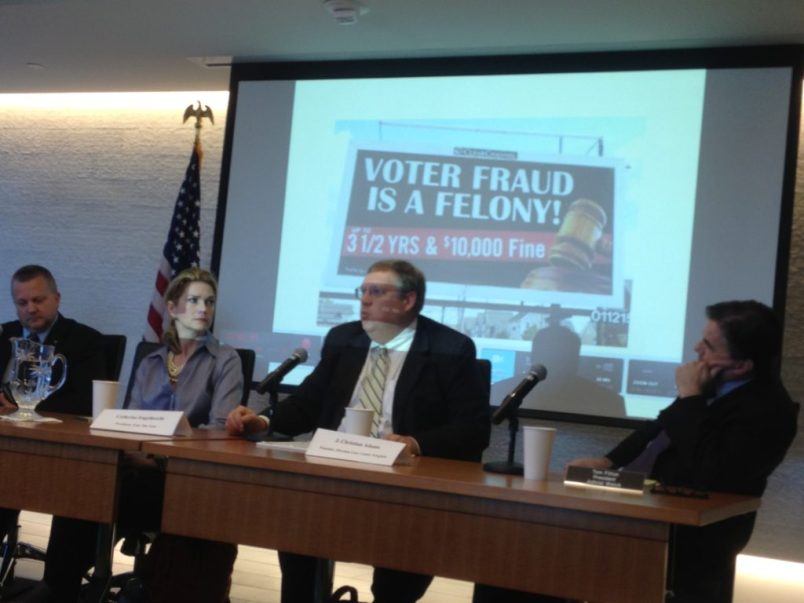ALEXANDRIA, VA — Former Trump voter fraud commissioner J. Christian Adams was in a federal court in Virginia Friday to defend reports his group released in 2016 and 2017 alleging that thousands of non-citizens were illegally registered to vote and possibly voting in Virginia.
Adams and his group, the Public Interest Legal Foundation, are being sued for defamation and voter intimation by four voters, all citizens, who were named in PILF’s reports that listed alleged non-citizen illegal registrants.
Attorneys for Adams and PILF argued that the reports were not targeting the defendants but rather the government officials who Adams claims are not enforcing voter fraud laws.
The plaintiffs argued that the report amounted to character assassination of those falsely alleged to be non-citizens. If anyone’s character was being assassinated, Adams’ attorney Michael Lockerby argued, it was those of the government officials who hadn’t prosecuted allegations of voter fraud.
The four voters — as well as the Richmond chapter of the League of United Latin American Citizens — allege Adams and PILF violated the Voting Rights Act and the Ku Klux Klan Act, as well as Virginia defamation law. Friday’s hearing, in front U.S. District Judge Liam O’Grady, was to hear arguments on the defendants’ motion to throw out the lawsuit.
Grady kicked off his questioning by asking Lockerby what responsibility Adams and PILF had to vet the public records they’d obtained from election registrars indicating voters who had been removed from the rolls. According to the complaint, one of the challengers was put on the registrars’ list of removals because a paperwork error.
“At the end of the day, these are public records,” Lockerby argued, blaming the government officials, rather than the defendants, for mistakenly listing the names.
He argued that PILF corrected the record for two of the plaintiffs and removed their names in the 2017 report. That claim was challenged by plaintiffs later in the hearing, who pointed out PILF was warned on multiple occasions it was mischaracterizing the voters, and only revised the second report after it had already been published.
Lockerby also argued that the publication of the reported was protected by the First Amendment and that Adams was exercising his right to draw attention to an issue of public interest.
“I can be worried about crime,” said plaintiffs’ attorney Cameron Kistler, a lawyer at the group Protect Democracy, “but that doesn’t mean I can falsely accuse my neighbor of being an ax-murderer to draw attention to the issue.”
Adams’ report, titled “Aliens Invasion,” claimed it found “1046 aliens who registered to vote illegally” and that “Each of the aliens we have discovered to have registered or voted has likely committed a felony.”
The follow-up report “Aliens Invasion II,” said that the Justice Department “has done nothing about the felonies committed by 433 suspected aliens registered in Prince William County alone.” The reports included appendixes that listed the names, and in some cases addresses and phone numbers, of the people alleged to be non-citizens who illegally registered.
Both sides encouraged the judge to read the report itself in assessing the issue.
Kistler argued during the hearing that it was not just the release of the public records themselves, but the “gloss they put on the public records” that was at issue.
Much of the hearing focused on whether LULAC had standing to bring the case, given none of its members were named and there was no explicit language referencing Latinos in the language of Aliens Invasion and Aliens Invasion II.
The judge offered questions skeptical of LULAC’s involvement in the case, suggesting that the “aliens” in the report could just as easily refer to Irish immigrants or immigrants of other nationalities.
He closed the hour-plus hearing promising a decision on the motion to dismiss soon, and telling the parties that discovery would not begin before that.
The case raised “very interesting issues,” he said.







Yep. No appeals to racism there.
Oh man, that’s good.
Well he was the Fraud Commissioner.
Thanks, Tierney for staying on top of the many threads of this national effort to disenfranchise citizens.
“Adams’ report, titled “Aliens Invasion,” claimed it found “1046 aliens who registered to vote illegally" and that “Each of the aliens we have discovered to have registered or voted has likely committed a felony.” … The reports included appendixes that listed the names, and in some cases addresses and phone numbers, of the people alleged to be non-citizens who illegally registered.”
Yeah, that sure sounds to me like “the reports were not targeting the defendants but rather the government officials who Adams claims are not enforcing voter fraud laws.”
Good luck with that argument.